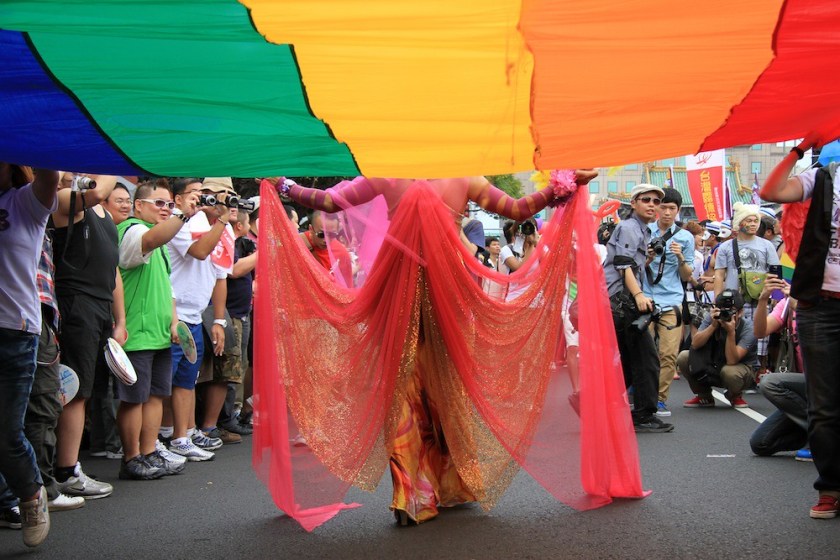Written by Hongwei Bao.
Image credit: Taiwan Pride by Carrie Kellenberger/Flickr, license CC BY 2.0
The celebration of marriage equality in Taiwan serves as a true inspiration for LGBTQ communities in other parts of Asia. What can we learn from the Taiwan experience? Quite a lot, actually, and I wish to highlight the following aspects:
First of all, government can play an active role in pushing for social change. Many Asian states exercise a strong power in setting legislative agendas and shaping social consensus. This power, exercised appropriately, can be used to advance social justice and citizenship rights. In a world where LGBTQ rights have become an important part of a country’s soft power and cultural diplomacy, Asian governments should take this opportunity to shape their national images positively in domestic and international contexts.
While marriage equality legislation is an important step towards gender and sexual equality, it is not the whole story. There are many other aspects including equal access to employment, education and social welfare, as well as adoption and surrogacy rights, which may take even longer to achieve. Also, gaining public support and building consensus is important. Without widespread support from across society, there may be a conservative backlash against newly achieved LGBTQ rights.
Another important point we can take away from this inspiriting success is that consensus is not a priori – it is a process. For those who question popular public opinion regarding marriage equality, we need to remember that consensus is a constant process of negotiation and is developed by multiple social agents and in various power configurations. A consensus only takes shape contemporarily within a specific historical context and is subject to change under different circumstances. Most important of all, a consensus requires constant struggle in order to consolidate the outcome. As this insight explains and predicts the bumpy road toward marriage equality in Taiwan, it should also inspire minority groups in countries who are still fighting for marriage equality.
This brings me to another thought: LGBTQ rights are not antithetic to Asian values but, in fact, queerness and Asianness are actually compatible. For decades, there have been arguments against LGBTQ identities and rights in Asia, citing that these are Western constructs and therefore do not fit into the Asian context. The legalisation of marriage equality in Taiwan has changed the debate once and for all. This event serves as a powerful testimony that there is nothing un-Asian about respecting diversity and difference in all societies.
It is especially useful to dive into and appreciate Asia’s rich histories and traditions of gender and sexuality. Instead of blaming the detrimental role played by Western colonialism and capitalist modernity for these traditions, it is more productive to reflect on how history and tradition can be used today to make a more convincing argument about the convergence of Asianness and queerness, and what many shapes such a convergence can take.
There are other resources in discourses of ‘Asian tradition’ that can be developed for queer use. For example, ‘Asian familialism’ — the high priorities given to families and kinship — can be used to provide cultural legitimacy for marriage equality. They can also offer family-and-kinship-based support networks for LGBTQ people.
I also feel that LGBTQ people cannot fight alone. We should build coalitions with other social groups, including our straight and cisgender allies and international friends, to fight against discrimination and for social justice. The antagonistic and confrontational type of activist strategy represented by the Stonewall experience in New York is unlikely to yield satisfactory results in Asia. We should devise culturally sensitive and context-specific strategies including the appeal for legislative and policy change.
Eventually, it is up to Asia’s LGBTQ communities to articulate their own concerns, needs and demands. Developed and rights-conscious communities are at the centre of the picture of fighting for gender and sexual equality. To develop communities, we need to undertake the long and arduous work of community-building to forge a collective identity and sense of community, to build an extensive peer-support network and to devise appropriate activist strategies.
Because of the cultural diversity and differences across political and social contexts in Asia, it is impossible to come up with a magic solution that fits all scenarios. Activists from various national, regional and local contexts should devise their own strategies and tactics. The long and arduous journey towards gender and sexual equality requires perseverance, tactics, hard work and, importantly, hope and optimism. In this regard, Taiwan has offered the rest of queer Asia a great deal of hope and optimism.
Hongwei Bao is an Assistant Professor in Media Studies at the University of Nottingham, where he also co-directs the Centre for Contemporary East Asian Cultural Studies. He is the author of Queer Comrades: Gay Identity and Tongzhi Activism in Postsocialist China.
After a long battle, same sex marriage was finally legalised in Taiwan on 17 May 2019, and parliament was asked to pass the change within the following week. In this special issue, Taiwan Insight shares the experiences of those who witnessed this historical moment and looks at some of the driving forces that led to this momentous breakthrough.

